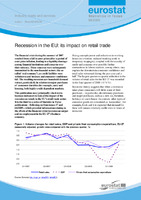| dc.description.abstract | The financial crisis during the summer of 2007 resulted from a fall in asset prices after a period of asset price inflation, leading to a liquidity shortage among financial institutions and concerns over their solvency. These concerns were subsequently transmitted to the non-financial sectors (the so-called ‘real economy’), as credit facilities were withdrawn and business and consumer confidence fell. The resulting recession saw household demand retract, particularly in relation to major purchases of consumer durables (for example, cars) and housing, both highly credit dependent markets. This publication uses (principally) short-term business indicators to look at the impact of the recession on trends in the EU’s retail trade sector. It is the third in a series of Statistics in Focus publications – following on from issues 17 and 60/2009 – which provided information relating to the effects of the financial crisis/recession on output and on employment in the EU-27’s business economy. Rising unemployment and reductions in working hours (no overtime, reduced working week or temporary stoppages), coupled with the scarcity of credit and concerns over possible further contractions in labour markets, among others, may explain the downturn in consumer confidence and retail sales witnessed during the past year and a half. The largest quarter on quarter reduction in the volume of retail sales for the EU-27 was recorded in the final quarter of 2008 (-0.74 %). Economic theory suggests that when a recession takes place consumers will defer some of their purchases – in particular, discretionary purchases and major purchases, such as a new car, furniture, holidays or a new house. In contrast, other types of consumer goods are considered as ‘necessities’, for example, food, and it is expected that demand for these will remain relatively stable even in times of recession. |

